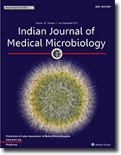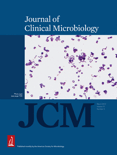
Indian Journal of Medical Microbiology
Scope & Guideline
Discovering Tomorrow's Solutions in Medical Microbiology Today
Introduction
Aims and Scopes
- Infectious Disease Epidemiology:
Research on the epidemiology of infectious diseases, including the prevalence, transmission dynamics, and risk factors associated with various pathogens affecting populations in India. - Antimicrobial Resistance:
Studies focusing on the patterns of antimicrobial resistance among clinical isolates, mechanisms of resistance, and implications for treatment strategies in managing infections. - Diagnostic Innovations:
Development and validation of novel diagnostic methods, including molecular techniques, rapid tests, and their comparative effectiveness in identifying infectious agents. - Clinical Microbiology:
Investigations into clinical presentations, outcomes, and management of infections caused by various microorganisms, with an emphasis on case studies and clinical trials. - Public Health and Infection Control:
Research addressing public health challenges, infection prevention strategies, and the impact of antimicrobial stewardship programs in healthcare settings. - Emerging and Re-emerging Pathogens:
Studies on newly identified pathogens, their clinical significance, and the challenges they pose to public health, especially in the context of outbreaks.
Trending and Emerging
- Molecular Diagnostics and Genomics:
There is a rising trend in the use of molecular diagnostics and genomic sequencing to identify pathogens and understand their resistance mechanisms, highlighting the shift towards precision medicine. - Antimicrobial Stewardship Programs:
An increasing number of studies focus on the implementation and effectiveness of antimicrobial stewardship programs, emphasizing the importance of combating antimicrobial resistance in clinical settings. - Impact of COVID-19 on Infectious Diseases:
Research related to the COVID-19 pandemic and its repercussions on the management of other infectious diseases has surged, including studies on co-infections and the long-term effects of SARS-CoV-2. - Emerging and Re-emerging Infections:
Publications on newly identified pathogens, such as those causing zoonotic infections, reflect a heightened awareness and response to emerging health threats. - Healthcare-Associated Infections (HAIs):
There is a growing emphasis on the epidemiology, prevention, and management of healthcare-associated infections, driven by the need to enhance infection control measures in healthcare facilities.
Declining or Waning
- Traditional Culturing Techniques:
There has been a noticeable decline in studies focusing on traditional microbiological culturing methods, as newer molecular and rapid diagnostic techniques have become more prevalent and favored in research. - Non-Infectious Disease Microbiology:
Research related to non-infectious aspects of microbiology, such as environmental microbiology or industrial applications, appears to be waning, with a stronger focus on infectious diseases. - Basic Research on Well-Characterized Pathogens:
There is a diminishing trend in basic research involving well-established pathogens, such as common bacterial or viral species, as the emphasis shifts toward novel and more complex pathogens. - Single-Center Studies:
The prevalence of single-center observational studies is decreasing, likely due to a growing preference for multi-center collaborations that provide more comprehensive data and insights.
Similar Journals

Microbiology Research
Unlocking the Secrets of Microbes for a Better TomorrowMicrobiology Research, published by MDPI, stands as a pivotal open-access journal in the field of microbiology, having established its presence since 2010. Based in Switzerland, this journal strives to provide a platform for innovative research and cutting-edge findings in various branches of microbiology, including medical microbiology and molecular biology. With an impact factor that reflects its dedication to scholarly excellence, Microbiology Research is classified in the Q3 category for both microbiology and medical microbiology, and Q4 for molecular biology as of 2023, indicating its growing importance and outreach within these domains. The journal aims to foster discussion and collaboration among researchers, professionals, and students by presenting articles that cover a wide array of topics and methodologies in microbiological research. Leveraging its open-access model, Microbiology Research ensures that high-quality research is accessible to a global audience, thus facilitating the advancement of knowledge and innovation in the microbial sciences.

New Microbes and New Infections
Bridging gaps in understanding novel infectious agents.New Microbes and New Infections is an esteemed peer-reviewed journal published by Elsevier Sci Ltd that has been a prominent platform for disseminating groundbreaking research in the fields of Infectious Diseases and Microbiology since its establishment in 2013. With an impressive Open Access model, this journal ensures that vital research findings are readily accessible to researchers, healthcare professionals, and academics worldwide. Positioned in the Q2 category for Infectious Diseases and Q3 for Microbiology in 2023, it reaches a significant global audience, as demonstrated by its high Scopus rankings—#44 out of 344 in Medicine: Infectious Diseases, and #34 out of 182 in Immunology and Microbiology. The journal aims to inspire new ideas and foster collaborations by publishing high-quality research focused on novel microbes and infections, thus playing a crucial role in advancing science and public health in an era where understanding infectious agents is more vital than ever.

Infectious Microbes & Diseases
Connecting knowledge to combat infectious threats.Infectious Microbes & Diseases, published by Lippincott Williams & Wilkins, is a premier journal dedicated to the exploration and understanding of infectious diseases, microbiology, and epidemiology. With its focused scope and robust peer-review process, the journal aims to disseminate high-quality research that contributes to advancements in the field, making it an essential resource for researchers, healthcare professionals, and students alike. Established in 2019, it has quickly gained recognition, achieving a Q3 rating in categories such as Epidemiology, Infectious Diseases, and Medical Microbiology in 2023, and ranking in the top half of its field within Scopus metrics. Although currently offered as a subscription-based journal, Infectious Microbes & Diseases significantly enriches its disciplines by inviting innovative research and critical review articles, thus playing a vital role in combating the global challenges posed by infectious diseases.

MICROBIOLOGY AND IMMUNOLOGY
Pioneering Discoveries in the World of Microbes and ImmunityMICROBIOLOGY AND IMMUNOLOGY, an esteemed journal published by WILEY, serves as a vital resource for researchers and professionals in the fields of microbiology, immunology, and virology. With its ISSN 0385-5600 and E-ISSN 1348-0421, this journal has been a cornerstone in scientific literature since its inception in 1977, bridging decades of research and innovation through its comprehensive coverage of emerging trends and discoveries. Although this journal operates without open access, it maintains a commendable presence in academic circles, reflected in its 2023 Quartile rankings of Q3 across the categories of Immunology, Microbiology, and Virology. As part of an important discourse in these disciplines, MICROBIOLOGY AND IMMUNOLOGY ensures its scholarly contributions are relevant to both seasoned researchers and emerging scholars. Positioned in a competitive journal landscape, with Scopus ranks indicating a median percentile across its fields, it remains committed to advancing knowledge through peer-reviewed articles, thereby supporting the continuous evolution of its focus areas. The journal's current scope encompasses topics critical for understanding pathogen-host interactions and the immune response, making it a crucial publication for any academic library or individual scholar dedicated to the biological sciences.

Frontiers in Cellular and Infection Microbiology
Leading the charge in microbiological excellence.Frontiers in Cellular and Infection Microbiology, published by FRONTIERS MEDIA SA, is a leading Open Access journal that has been at the forefront of microbiological research since 2011. Located in Switzerland, this journal aims to provide a platform for innovative and impactful studies in various domains including immunology, infectious diseases, and medical microbiology. With an impressive range of quartile rankings—Q1 in Infectious Diseases, Microbiology, and Microbiology (medical), and Q2 in Immunology—as of 2023, it positions itself as a highly reputable source in the academic community. Furthermore, its Scopus rankings highlight its significance within the respective fields, with top percentiles in key categories, making it an essential resource for researchers, professionals, and students alike. As an Open Access publication, it ensures that vital findings are accessible to a global audience, fostering collaboration and advancement in science.

Infectious Diseases and Clinical Microbiology
Advancing knowledge in infectious diseases and microbiology.Infectious Diseases and Clinical Microbiology is a pivotal journal dedicated to advancing our understanding of infectious diseases through rigorous scientific research and clinical practices. Published by DOC DESIGN INFORMATICS CO LTD, this journal serves as a vital platform for researchers, healthcare professionals, and students keen on enhancing their knowledge of microbiological sciences and the clinical implications of infectious agents. With an ISSN of 2667-646X, it aims to disseminate significant findings in the field, enriching the scholarly dialogue surrounding infectious diseases. While currently operating under a traditional access model, the journal encourages global collaboration and knowledge sharing, striving to make a meaningful impact in tackling the challenges posed by infectious diseases. Its content aims to bridge the gap between laboratory research and clinical application, making it an essential resource in the contemporary landscape of global health.

New Microbiologica
Connecting science and health through groundbreaking microbiological studies.New Microbiologica is a prominent academic journal published by EDIZIONI INT SRL, dedicated to advancing knowledge in the fields of Microbiology and Medicine. Since its inception in 1993, this journal has played a vital role in disseminating cutting-edge research, featuring articles that explore the intricate relationships between microorganisms and human health. With an H-index indicating a robust citation profile and a respectable 2023 Scopus Ranking placing it in the 32nd percentile for medicine microbiology, New Microbiologica resonates well within the academic community. Although not an Open Access journal, it is strategically positioned in Quartile 3 of both Medicine (miscellaneous) and Medical Microbiology categories, which reflects its importance to researchers and professionals seeking valuable insights in their fields. Published in Italy, the journal continues to provide a platform for impactful research through its commitment to high-quality publications, fostering collaboration and innovation among scientists and academics in the ever-evolving landscape of microbiological studies.

JOURNAL OF CLINICAL MICROBIOLOGY
Contributing to the Future of Healthcare SolutionsJOURNAL OF CLINICAL MICROBIOLOGY, published by the American Society for Microbiology, stands as a premier resource for researchers and professionals in the field of medical microbiology. With an illustrious history dating back to 1975, this journal has consistently provided high-impact research, reflecting its status in the Q1 category among microbiology (medical) journals, and an impressive Scopus rank of 14 out of 140, placing it in the 90th percentile. The journal's commitment to unveiling foundational and innovative studies greatly contributes to understanding human health challenges posed by microbial pathogens. Researchers can expect rigorous peer-reviewed articles that cover a spectrum of topics, from diagnostic methods to clinical epidemiology, fostering a deeper understanding of microbiology's role in healthcare. While this journal does not offer open access options, its substantial impact factor underscores its relevance in shaping the conversation in clinical microbiology. The JOURNAL OF CLINICAL MICROBIOLOGY is indispensable for anyone dedicated to advancing their knowledge and practical skills in microbiology.

EPIDEMIOLOGIE MIKROBIOLOGIE IMUNOLOGIE
Transforming Understanding Through Scholarly ResearchEPIDEMIOLOGIE MIKROBIOLOGIE IMUNOLOGIE is a prominent scholarly journal published by CESKA LEKARSKA SPOLECNOST J EV PURKYNE in the Czech Republic. With an ISSN of 1210-7913, this journal has been at the forefront of research since its inception in 1994, showcasing a rich repository of studies bridging the domains of epidemiology, microbiology, immunology, and infectious diseases, and reflecting advancements over three decades. Although it currently falls within the Q4 category in multiple fields including Epidemiology and Microbiology, the journal serves an essential role in disseminating knowledge and fostering discussions around public health challenges. The contributions made through its pages are vital for researchers, healthcare professionals, and students aiming to enhance their understanding of complex biomedical issues. While it does not offer open access, the journal remains a critical resource in its niches, inviting readers to engage with the latest findings and methodologies reshaping the landscape of health science.

Current Clinical Microbiology Reports
Transforming Knowledge into Action Against Infectious DiseasesCurrent Clinical Microbiology Reports, published by Springer, is a leading international journal dedicated to advancing the field of clinical microbiology. With a focus on the diagnosis, treatment, and prevention of infectious diseases, this journal serves as a vital resource for researchers, medical professionals, and students engaged in microbiological studies. As a testament to its quality and influence, it holds an impressive impact factor and ranks in the Q1 category in both Infectious Diseases and Microbiology (medical), reflecting its prominent standing in the scholarly community. Additionally, it features a commendable Scopus ranking, placing it in the 77th percentile for Medicine - Infectious Diseases and the 69th percentile for Medicine - Microbiology (medical). With contributions spanning over a decade, from 2014 to 2024, the journal continues to publish high-quality research articles that shape the future of clinical practices and public health policies. While access options are variable, the journal's commitment to open dialogue and dissemination of knowledge makes it a pivotal platform for those passionate about tackling microbial challenges in healthcare.